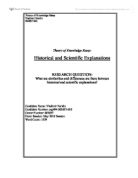Bertil Jessen 3.I Kolding IB world school 01/03/08
Tok Essay prescribed title number 3
Candidate: 001490-022
TOK Essay prescribed title number 3
Historical orthodoxy's subjectivity and change
“History is always on the move, slowly eroding today’s orthodoxy and making space for
yesterday’s heresy.” Discuss the extent to which this claim applies to history and at least one
other area of knowledge.
Bertil Jessen 3.I
12/03/07
Candidate: 001490-022
Word count: 1542
It is man’s ability to remember
that sets us apart
we are the only species concerns with past
how memories give us voice
and bear witness to history so that others might learn
so they might celebrate our triumphs and be warned of our failures
there are many ways to define our fragile existence
many ways to give meaning
but it is our memories that give its purpose and shape its context
the private assortment of fears, love and regret
what is the cruel irony of life that we are destined to hold the dark with light.
History teaches people of the major conflicts of the past, and analyses these aspects and their causes through extensive comparisons with public sentiments at their respective times and as such the truth changes according to their respective times of publishing and access to documentation.
The statement that “history is always on the move” is particularly obvious. Times change, and vary the fabric of opinions and accepted facts, even moral and ethical dilemmas are differently approached at these different times. The truth of a given situations reality will remain unaltered throughout time, and yet the theories of behaviour and motivation in a given time may differ. The changes in the interpretation of the perceptions and new interpretations based on new evidence, open up for a wider and more accurate conclusion as more evidence becomes available. For instance, for the allied countries during ww2, the perception may have been that all germans are evil, and therefore started the war, and in later interpretations it has become clearer that the versaille treaty in the start of the 20's left the germans with a set of rules which were too tight to be complied with, and therefore may have sparked the german greviences that started the war. As such, the real situation for the people has remained the same in this situation, but as more evidence or source material becomes available, more factors can be included in an overall interpretation of a given situation. The theories therefore change to suit the new evidence, and this erodes past claims and theories in an effort to fit the evidence with a new explanation or theory and adapts them to include not only the orthodox and biased sentiments but also the heretic and abstract points of view. As such the statement “History is always on the move” only applies to the theories concerning the motivations and analyses of the events of past history, but does not concern the actual events which remain unchanged. Another somewhat recent historical scenario that provides evidence of this claims relevancy and applicability extending to the theoretical knowledge of history can be found in the former USSR. In later parts of the 1900's the soviet union boasted huge productionary successes and an overall economical well-being, be that as it may, it was only true to some extent. It has become evident in the 1990's after the fall of the empire that their achievements show no real succes in relation to the welfare of the population. The theories of the state of the population within the soviet union therefore used to convey an image of financial succes but post revelations of their actual production values found in soviet archives imply that other aspects of the soviet economy suffered at the expense of the wellness of the population.







